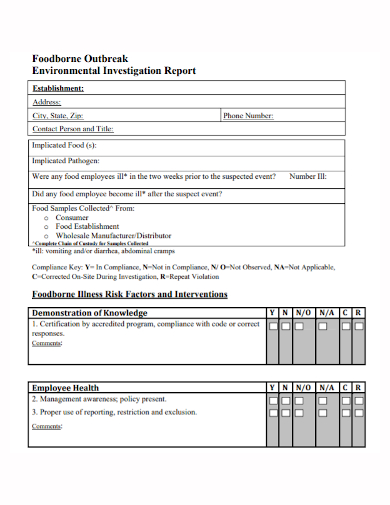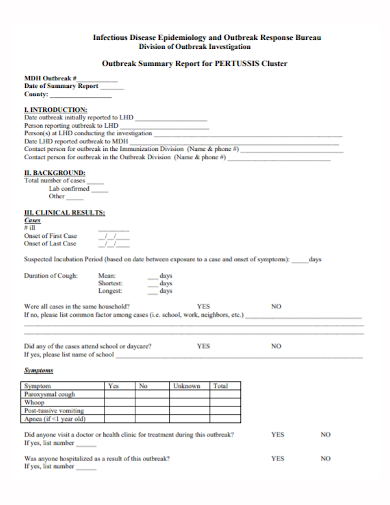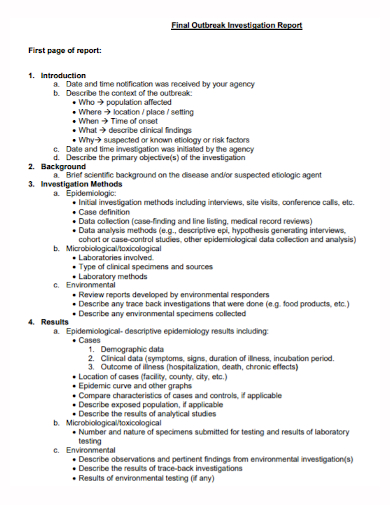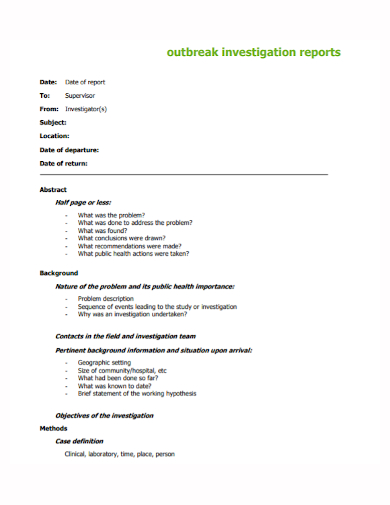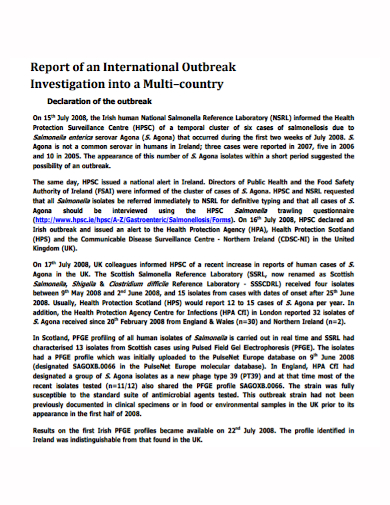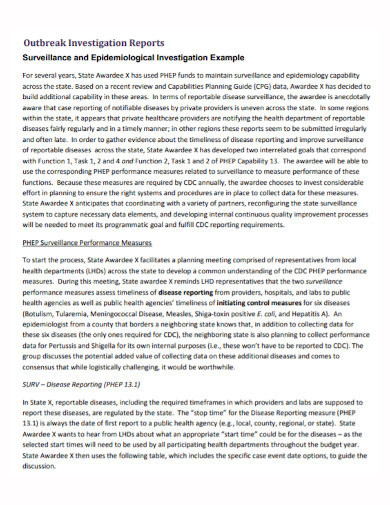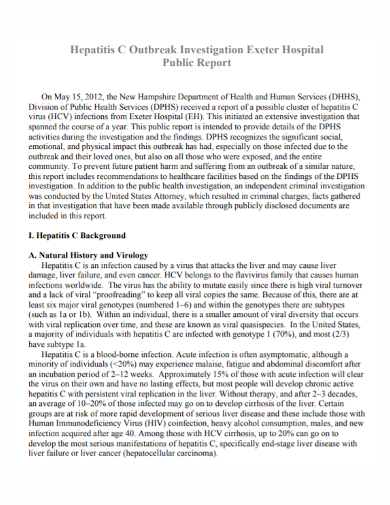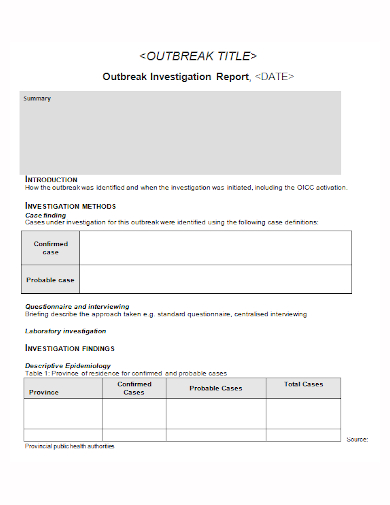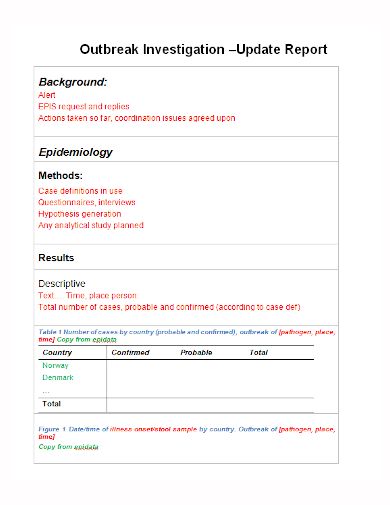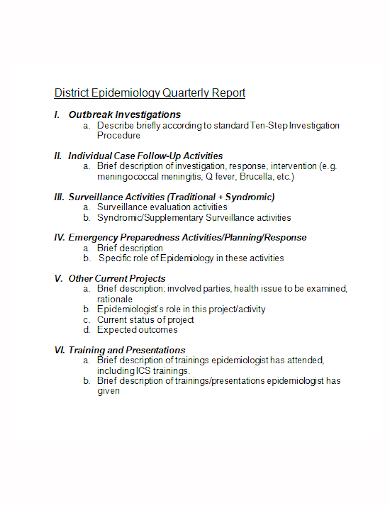The word outbreak nowadays is almost synonymous to the recent pandemic that has plague the entire world which is the coronavirus disease or covid-19 in short. Outbreaks are not limited to such type of disease as this could be sometimes a single case of an infectious disease may be considered an outbreak. This may be true if the disease is rare like foodborne botulism or has serious public health implications such as bioterrorism agent such as anthrax. Outbreaks can create serious and dire implications to a community or in fact a whole country, so it is without question an investigation is immediately conducted and summarize into what we call an outbreak investigation report. Know more about this in our article and check out our various free outbreak investigation report samples below:
9+ Outbreak Investigation Report Samples
1. Outbreak Environmental Investigation Report
2. Outbreak Investigation Summary Report
3. Final Outbreak Investigation Report
4. Sample Outbreak Investigation Report
5. Standard Outbreak Investigation Report
6. Outbreak Surveillance Investigation Report
7. Outbreak Investigation Hospital Report
8. Printable Outbreak Investigation Report
9. Outbreak Investigation Update Report
10. Outbreak Investigation Quarterly Report
What Is an Outbreak Investigation Report?
An outbreak is a sudden or violent increase of something dangerous such as disease. This may occur in a community or geographical area, or may affect several countries. It may last for a few days or weeks, or even for several years. To immediately address this serious concern, a decision to conduct a field investigation of an acute outbreak has been made, working quickly is essential — as is getting the right answer. Right after the investigation, an outbreak investigation report is then created which contains details the findings of an investigation as soon as a rise of an incident occurs. This outbreak report summarize how the outbreak was detected, the investigations that were conducted, the interventions that were carried out to control it, provide descriptive epidemiology and outcomes.
How to Write an Outbreak Investigation Report?
An outbreak is essentially the same thing as an epidemic such as an increased frequency of a disease above the usual rate in a given population or geographic area. While pandemic refers to simultaneous epidemics occurring in multiple locations across the globe. These terms are often referred to infectious diseases, but this can also related non-infectious diseases and chronic conditions, such as lung cancer and obesity. Overall, the principles of investigation are similar for all of these. Let us go over the steps involved in outbreak investigations:
I. Title of Report
Indicate whether this is a preliminary or a final report. Keep the title short and direct to the point, but include information on the type of problem under investigation, the location and date.
II. Introduction
This section must contain the statement of the problem and its public health importance. Details and time frame regarding initial source of information, context of the outbreak and primary objectives of the investigation. Reasons for investigating event and type of investigations conducted and agencies involved.
III. Background
Describe the scientific background on the disease, description of the problem and sequence of events leading to the study or investigation. A generally available information to help the reader interpret epidemiology and data presented in the report. If the outbreak happened in a commercial area such as a restaurant include a description of the premise.
IV. Report Objectives
Objectives should include any hypotheses and specify targets or goals to be achieved by the investigations.
V. Investigation Methods
- Epidemiologic – analysis of the distribution, patterns and determinants of health and disease conditions in defined populations. Identify the initial investigation methods (such as interviews or site visits) case definition, data analysis method and collection–including questionnaire design, administration and contents.
- Microbiological/toxicological : methods of specimen collection and processing, laboratories involved and method and analysis used.
- Food and food testing : description of inspection process -describe any trace back investigations that were done; methods of food and environmental sampling and laboratory method and data analysis.
VI. Results
Lay out all pertinent results from clinical, laboratory, epidemiological and environmental findings.
Epidemiology – descriptive epidemiology results including:
- number of cases, overall attack rate
- clinical details of the illness
- descriptive epidemiology by time, place and person
- compare characteristics of cases and controls
- risk factor exposures
Microbiological/toxicological or chemical
- Describe the number of specimens collected and results of the laboratory testing
Food investigation and food testing
- Report the food findings investigation and results of laboratory tests performed on food and environmental samples. Describe the results of trace-back investigations.
V. Conclusion / Discussion
Analysis and interpretation of the investigation results and any conclusions drawn as a result of this investigation. This should cover the following important details:
- Summary of the findings
- Discuss the main hypothesis and define the risk factors
- Conclusions with justification for those conclusion and rejection of alternative explanations
- Explain what was done to control the outbreak and further assessment of the control measures
- Any implications of the findings and if future research is advised.
- Educational message and health information to the public, public health professionals and policy makers
- Recommendations to improve investigation and management of such outbreaks in the future
VI. References
Select and cite appropriate references, including reviews in major scientific journals. Reports should be written objectively based on scientific data.
FAQs
What Is an Infectious Disease?
An infectious disease are disorders which is caused by organisms such as bacteria, fungi, virus or parasites. Although we are surrounded by bacteria and the such, there are certain conditions that can trigger this and cause a disease. Which can be sometimes harmful to others as it can be passed on to the next person.
What Is a Foodborne Illness?
Or food poisoning in other terms is a disease caused by intake of certain food that contain harmful and hazardous organisms in them. These harmful germs can include bacteria, parasites, and viruses.
What Is an Epidemiology Information?
Epidemiological information is used to plan and evaluate strategies to prevent illness and as a guide to the management of patients in whom disease has already developed.
Outbreaks, pandemics and the such are very serious and dire matters that can not only result to increase in death rates, but can plunge economies into ruin and create catastrophic effects on the population and human’s way of living in general. So it is crucial and mandatory to immediately conduct outbreak investigations in order to identify the source and establish control and to institute measures that will prevent future episodes of disease. They are also sometimes undertaken to train new personnel or to learn more about the disease and its mechanisms for transmission. With this an outbreak investigation report can be an important reference not only in the present but for the future should any outbreaks tend to erupt once again.
Related Posts
FREE 10+ Investigation Checklist Samples
FREE 10+ Job Incident Report Samples
FREE 10+ Workplace Investigation Checklist Samples
FREE 10+ HR Incident Report Samples
FREE 10+ Workplace Harassment Investigation Samples
FREE 7+ Sample Forensic Report
FREE 7+ Harassment Investigation Checklist Samples
FREE 5+ Investigation Log Samples
FREE 5+ Investigation Outcome Letter Samples
FREE 3+ Criminal Investigation Checklist Samples
FREE 17+ Audit Report Samples
FREE 11+ Forensic Audit Report Samples
FREE 10+ Compliance Report Samples
FREE 10+ Hospital Incident Report Samples
FREE 10+ Investigation Plan Samples

